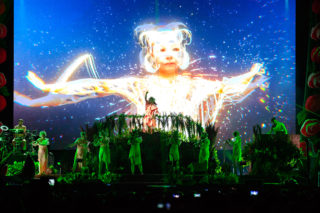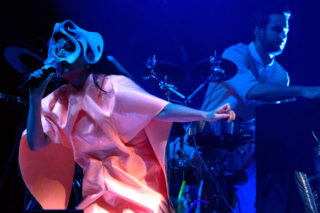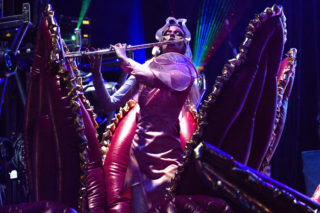Björk’s answer to the question of how to headline a music festival in 2018 is bold as fuck
She's in there, among the rainforest foliage and giant fairy-lit lotus flowers

She's in there, among the rainforest foliage and giant fairy-lit lotus flowers
Throughout her career, Björk’s relationship with conformity has seldom been a smooth one, and in the past decade has become virtually non-existent to the point where, today, her wildly leftfield imagination almost holds more appeal than her actual songs. But even by Bjorkian standards, her latest answer to the question of how to headline a major music festival is bold: shortly after sundown on Thursday evening, the Primavera main stage transforms into a thicket of rainforest foliage and giant fairy-lit lotus flowers surrounding a six-foot high revolving vagina, from which are born Bjork’s band for the evening: an all-female flute septet and a harpist. A laptop operator and electronic drummer lurk in the wings, just in front of a huge screen displaying images of exotic seabirds, digitally fractured renaissance stained glass, and 3D renderings of the singer herself as a hybrid biosynthetic android queen.
While it’s hard to believe anyone attending a Bjork gig in 2018 is expecting ‘It’s Oh So Quiet’, it’s also quickly apparent that the coming 90 minutes will be Bjork at her most high-concept: a statement scrolls up the screens beforehand imploring readers to “imagine a world where nature and technology collaborate, and then make a song about it”, and to “imagine something that doesn’t exist and demand space for hope, weave a matriarchal dome”. The setlist draws heavily on ‘Utopia’, her newest and toughest record, rarely alighting on anything familiar to the casual Bjork fan, and her vision is clear and pure: this is a show about womanhood, the ecology and human survival and rebirth, told with seriousness, tenderness and huge amounts of passion, and any toe-tapping melodies that happen to creep in along the way should be chalked up as a bonus.

Yet despite all that, this is not “difficult” listening: Bjork’s voice is still an astonishing instrument, as precise and powerful as it is feral, and the songs from ‘Utopia’ are here set free of the digital fuzz that textured much of the album and consequently allowed to breathe and pulse with a rather enthralling naturality. The flute rearrangements of both ‘Isobel’ and ‘Human Behaviour’ (the only nods tonight to Bjork’s long-abandoned pop period), too, render them as genuinely funky 70s soul pieces, and there’s even room on ‘Sue Me’ and ‘Wanderlust’ for Bjork to enter full techno-banger mode: she frequently punches the air ecstatically, like a raver lost in the music, and while that ecstasy is unfortunately impossible to project to 30,000 people, it’s moving to witness a group of women creating such a blissful paradise.
Nonetheless, in the context of the rest of Primavera’s bill, this is still inarguably challenging, almost to the point of provocation, and much debate is heard around the site afterwards about what place this sort of unbridled performance art music has at a major festival. Whether the artist with the biggest point size on the poster needs necessarily to appeal to the most amount of people, however, is not really Bjork’s problem to deal with – there’s plenty else to see, after all. What’s also simultaneously inarguable, though, is that while a deeply eccentric and potentially Marmite show, this is also technically flawless, deeply original, engrossingly phantasmagoric fare, confirming that Bjork’s approach to public orthodoxy remains as knotty as ever.

Photos: Primavera Sound / Santiago Felipe